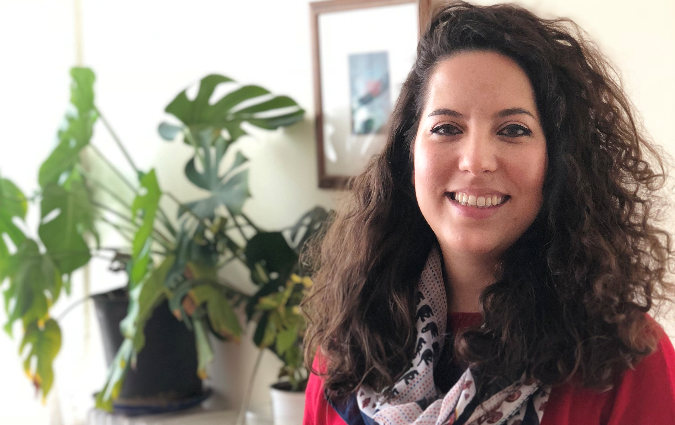Surviving Violence, Helping Others to Access Justice
Date:

36-year-old Günçe Çetin, a successful lawyer from Ankara, the capital of Turkey, has suffered the trauma of intimate partner violence for several months between 2012 and 2014. She experienced physical, psychological, and economic violence at the hands of her boyfriend.
At first, she blamed herself for the situation and never considered reporting her partner. But after he beat her so severely that she had to get stitches in her mouth, she fled their home with the support of her lawyer friends and went to the police station.
“An officer asked me, ‘You too, Ms. Lawyer?’ I couldn’t get this question out of my mind. Yes, me too, I am a survivor of systematic violence by an intimate partner,” recalls Ms. Çetin.
Some time after this episode, she participated in a training on the legal framework in Turkey on violence against women conducted by the Foundation for Women’s Solidarity (FWS), and she started to volunteer her time providing legal services for survivors of violence against women.
Last year, she participated in a series of trainings on international legal frameworks on violence against women implemented by the human rights NGO Capacity Development Association in partnership with FWS within the framework of the EU-UN Women Regional Programme on Ending Violence against Women “Implementing Norms, Changing Minds”.
Including modules such as violence and trauma, feminist methodology, and international legal frameworks, the trainings cover the Council of Europe Convention on preventing and combating violence against women and domestic violence, also known as the Istanbul Convention, the Convention on the Elimination of All Forms of Discrimination against Women (CEDAW) and resources from the European Court of Human Rights.
At the trainings, Ms. Çetin realized that violence can be physical, psychological, and verbal. “At first, I didn’t think I was facing violence. I thought that he was just jealous, that he didn’t like my job, that he was controlling everything. But these behaviours are violence as well. The trainings made me realize the full dimension of the definition of violence.” After the trainings, she started to think, “If I am exposed to violence, what about other women?”
She is now using her own personal and professional experiences to focus on lawsuits concerning violence against women and LGBTI people. “As lawyers, we don’t have practice in international law mechanisms and international conventions. We are more focused on practicing local legislation. The trainings showed me another dimension of legal practice. We learned feminist methodology as well,” states Ms. Çetin.
61 women lawyers from 43 provinces of Turkey who participated in the trainings learned how to integrate relevant international jurisprudence to strengthen cases of violence against women in local courts. After the training, the group built an online network in order to share their experiences and questions. “We are building a line of defence against violence mechanisms. In doing so, we build women’s solidarity,” she says. As a result of the trainings, she feels a stronger sense of self-empowerment, both personally and professionally.
Huriye Karabacak, one of the trainers and a volunteer lawyer from FWS, says that they expect that communication and cooperation between lawyers will continue. “The interest for the trainings is growing. We should share the experiences with other lawyers as well.”
According to Evrim Inan, a lawyer from Mugla, a province in the southwest of Turkey, the trainings have raised awareness about gender equality and gender stereotypes. “I was feeling there was a lack of feminist law methodology. Thanks to these trainings, we gained different perspectives during judgments. The way we handle cases has changed. I have learned that there are many women lawyers like me with the same point of view and dedication. The trainings have empowered me,” says Evrim.
Meltem Anayaroglu, another lawyer who attended the trainings, sees the trainings as her personal revelation. “I raised my own awareness on violence against women. I began to see things that I had been ignoring before. I had a revelation.”
Feray Salman, the General Coordinator of the Capacity Development Association, states that they aim to create an empowerment space for women lawyers. “Before we established this network, women lawyers were working alone, individually. We created this space so that they could share their legal practices and access information about international norms and violence against women. Access to information empowers women lawyers. They are from different provinces, but they encounter the same problems during lawsuits,” says Salman.